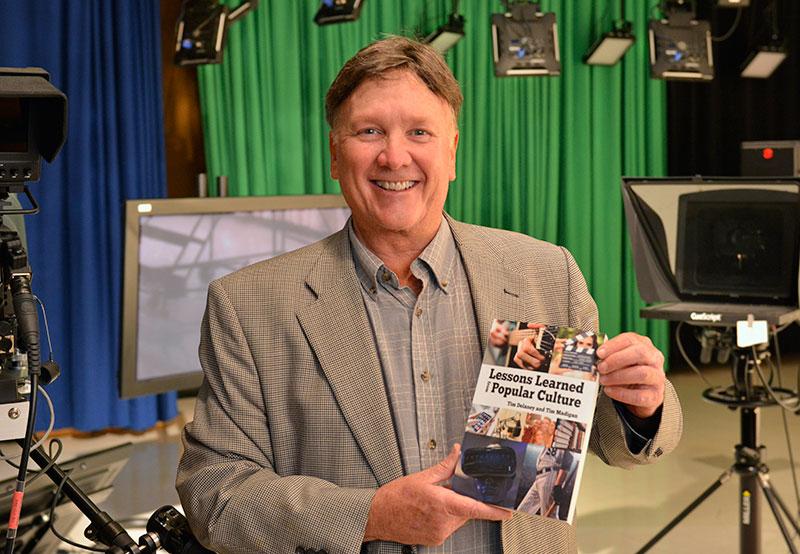Culture of the people—Tim Delaney, SUNY Oswego professor and chair of sociology, co-authors with St. John Fisher faculty member Tim Madigan a new book titled “Lessons Learned from Popular Culture” that shows how various kinds of media drive societal attitudes and behaviors.
Miley Cyrus and Dr. Dre, “Mortal Kombat” and “Star Trek,” Festivus and the Ice Bucket Challenge—they all make it into an academically motivated but approachable new book on popular culture from SUNY Oswego sociology chair Tim Delaney and co-author Tim Madigan of St. John Fisher College’s philosophy department.
SUNY Press recently published “Lessons Learned from Popular Culture,” a 274-page book that Delaney says “entertains as it reflects and provides valuable life lessons about popular culture,” a niche formerly frowned on in some circles as an area for serious research.
Media around the nation frequently have consulted Delaney as an expert in such areas as sports and sociology—including recently on NFL quarterback Colin Kaepernick’s refusal to stand for the National Anthem. Popular culture, Delaney said, is the tie that binds.
“It is the culture of the people,” he said. “It’s something we can afford a lot more easily than ‘high culture.’ It reflects our attitudes and our values.”
Delaney and Madigan divide the fickle and ever-changing world of popular culture into six stories about each of 10 media or genres: movie, television, social media, music, radio, newspapers and comics, books, fads and fashions, sports, and virtual reality. Along the way, they look to offer “lessons learned”—some entertaining, some profound—in each realm.
The book addresses a fast-moving, buzz-driven world where hula hoops and “Peanuts,” Wolfman Jack and George Carlin, “The Ed Sullivan Show” and “Pinocchio” might all seem quaint. The authors slow the modern world down by discussing some serious subjects: how Facebook and Twitter gather and use information, how rappers and hip hop artists give voice to the disenfranchised, why the same people who would never shoplift think it is OK to download and share copyrighted music for free.
“You don’t have to be a student or an academic to appreciate this book,” Delaney said. “It’s not heavy with academic jargon. But yes, it does deal with history. Yes, it does discuss the evolution of media. You can learn a lot from this book about the influence of popular culture on our society.”
Delaney has dealt with popular culture in some form or other in many of his 17 books, and has taught such courses as “Sociological Concepts and Theories Through Television’s ‘Seinfeld’.”
“Attitudes about popular culture in academics have changed,” said Delaney. “If it’s important to people, it’s got to be important to academics who study what is popular to people and why.”
Many are the teachers of “serious” academic subjects who have reached into popular culture to help students grasp complex subjects, Delaney said, and he is no different.
“You realize the best way to help students is to relate to something in popular culture,” he said. “They get a kick out of it when I can relate to them in that way.”




